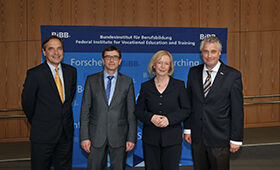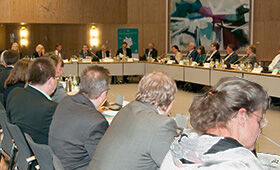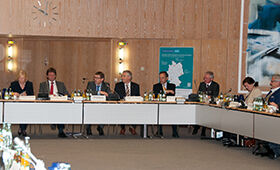The central importance of vocational education and training – ideas sought – lateral thinking permitted
Federal Minister Wanka takes part in discussions with the “Parliament of Vocational Education and Training” at BIBB

Professor Johanna Wanka, Federal Minister of Education and Research, attended the summer meeting of the BIBB Board on 21 June 2016 in order to network with members. The statement she made and the talks she conducted with a body which is also often referred to as the “Parliament of Vocational Education and Training” both focused on opportunities and challenges and on strengthening vocational education and training. At the very outset of her extensive dialogue with BIBB, the minister emphasised the multitude of activities undertaken by the institute that were relevant to research, policy making and practice and stressed the central significance of initial and continuing VET in Germany.
The minister entered into detailed discussions with Board members representing the employers, employees, federal states and the federal government. The main topics addressed were the balance between academic and vocational education and aspects of permeability, changes in the world of work and in VET brought about by digitalisation and opportunities and approaches in respect of the integration of refugees.

All those present were of the firm view that vocational and academic training should not be perceived as competing forces. The focus needed to be on making clear the opportunities that both educational pathways had to offer. Participants positively welcomed the fact that permeability had significantly improved over recent years whilst also noting remaining hurdles in the form of entrance examinations or trial semesters at institutes of higher education for those holding vocational qualifications. Further important points mentioned were expansion of vocational orientation in Years 7 and 8 and in Years 10 and 11 at upper secondary school and guidance services for persons dropping out of higher education.
Wide-ranging attention was devoted to integration of refugees into and via vocational education and training. This represented a considerable opportunity if integration could be successfully realised. The focus needed to be on promoting the wide range of great possibilities offered by dual training, particularly amongst refugees. Most of the latter were entirely unaware of the system of dual VET and were thus not taking advantage of it. Further important aspects up for debate were support and special advanced training for vocational school teachers, the positive role played by the transitional area as a helpful instrument for encouraging involvement in training on the part of young refugees in particular and and participation by women, which needed to be accorded greater focus. Several participants in the discussion stressed the importance of using existing opportunities, such as part-time training alongside family life, work and/or a language course rather than pursuing special pathways or implementing “2nd class” training courses. Language competence was also urgently necessary and could be rapidly developed further within the work context.

Digitalisation in the shape of “Industry 4.0” was also a key topic. This heading also extends beyond industry to encompass the restructuring of the world of work and its sequences in overall terms. The focus in this regard needed to be on imparting the required skills, particularly in the intermediate labour market segment. The good position enjoyed by major companies had to be broadened and achieved in the same way for small and medium-sized companies. This would require a training and qualifications initiative, and a multitude of approaches in this respect was already in place at inter-company vocational training centres. Federal Minister Wanka felt that this was an area in which ideas were needed from all those involved, including from amongst those present and their institutions. Projects, surveys and investigations were underway at BIBB in order to identify approaches for the necessary changes (see the topic page “Economy 4.0 – digitalisation of the world of work).
The minister, who is seeking to continue her dialogue with the Board in future, concluded by saying that BIBB’s role as a research institute also provided scope for “visionary lateral thinking”.